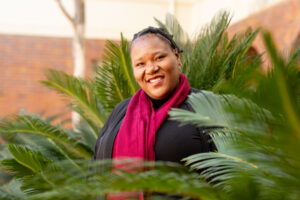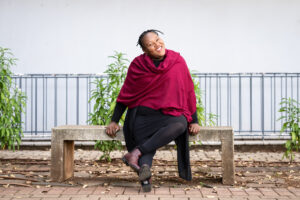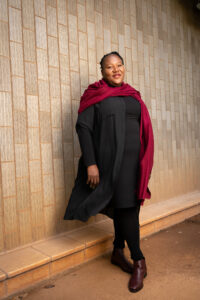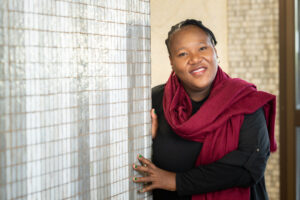
Dr Degracious Kgoale is the first in her family to hold a doctorate. Photo EYEscape/CoE-FS.
Degracious Moloko Kgoale, who recently graduated with a PhD in Biotechnology from the University of Pretoria, has spent years digging into an everyday but underexamined threat in South African food: the bacteria hiding in leafy greens like morogo, a staple for many families, especially in low-income communities.
Dr Kgoale is a DSTI-NRF Centre of Excellence in Food Security (CoE-FS) grantee. Her research, supported by the CoE-FS, sheds new light on how vegetables grown and sold through small-scale, informal supply chains can carry dangerous bacteria. But just as importantly, her work makes a passionate case for food safety as a shared responsibility.
“People often think food poisoning is just a stomach bug. But it’s often the result of invisible germs on the food we eat daily,” said Kgoale.
“These germs can be deadly, especially when they’re resistant to antibiotics.”
Making the invisible visible
Kgoale’s academic path has been steady and determined, with a strong foundation in biology, which started with a love for the subject in high school.
“I got a distinction in biology in matric, and I knew then that I wanted to understand the invisible things that affect our lives.”

Kgoale’s PhD research focused on morogo, also known as “African spinach”. Photo EYEscape/CoE-FS.
She pursued all her degrees at UP, co-host of the CoE-FS: a BSc, honours, master’s, and finally her PhD in Biotechnology. Her PhD, supervised by CoE-FS co-director and Food Safety lead Professor Lise Korsten, focused on the microbial quality and safety of leafy green vegetables in informal supply chains. She collected samples of vegetables, soil and irrigation water from various small-scale farms to see how bacteria travel between them.
“I wanted to know, where are these germs coming from? How do they get onto our food? And what can we do about it?”.
Bacteria deep-dive
Among the most worrying findings: multidrug-resistant Salmonella and E. coli that cause diarrhoea. These bacteria didn’t just show up once; they were repeatedly found in samples of water, soil, and the vegetables themselves. Kgoale’s research indicated a real risk of contamination in the farm-to-table chain.
“What shocked me the most was finding bacteria that not only make you sick but don’t respond to medicine anymore. These are superbugs, and they’re in our food supply.”

For Kgoale, food safety is a shared responsibility. Photo EYEscape/CoE-FS.
She also used genetic techniques to look at the bigger bacterial picture – or microbiome – of these farms. That means she wasn’t just testing for specific germs, but exploring the full range of bacteria in the environment.
“Each farm had its own bacterial fingerprint. But many shared harmful traits, and many didn’t meet basic safety standards,” said the food safety researcher.
Why leafy greens?
Kgoale chose to focus on morogo and other leafy greens because they’re so widely eaten, especially in informal settlements and rural areas.
“People eat leafy greens every day: they’re nutritious, affordable, and part of our culture. But they’re also eaten raw or lightly cooked, which means germs don’t get killed. That can sometimes make them risky.”
Changing the attitude to food safety
One of the biggest takeaways from her research isn’t just scientific; it’s behavioural. Kgoale believes food safety needs to be a policy, as well as a daily mindset.
“We need to change how people think about germs. You can’t see them, but they’re there. Washing your hands, using clean water, keeping food separate – these things save lives.
“Food safety isn’t singularly for either big companies or informal traders. Everyone who grows, sells or eats food deserves to be protected – and needs to play a part,” she said.
“Googleable”: The power of recognition
Kgoale’s work was supported by the CoE-FS, which provided both funding and visibility. She credits the CoE-FS for making her research known and enabling her to travel to conferences, meet leading scientists, and access advanced lab tools.
“I’m a ‘googleable’ being now,” she laughs. “Thanks to the CoE-FS, my work is out there. I’m proud of that. They believed in me, and I want to pay it forward.”

Next for Kgoale is a postdoctoral fellowship, training new biotechnologists and holding the door open for someone else, as it was for her. Photo EYEscape/CoE-FS.
And Dr Kgoale isn’t stopping. She’s planning to pursue a postdoctoral fellowship, continuing her work in food safety while mentoring new biotechnologists.
“I’m the first in my family to hold a doctorate, Dr Kgoale. That means something.”
“I want to stay in research, keep pushing the science, and help train the next generation. I’m walking through a door that others helped open for me. Now I want to hold that door open for someone else.”
related Articles
Food, power, and inequality: Vision for a fairer food system
Oscar Sithole is a PhD candidate at the University of Pretoria, and a grantee of the CoE-FS. Photo EYEscape/CoE-FS. Oscar…
Dr Mondli Masanabo’s path of passion, perseverance, and purpose
Dr Mondli Masanabo graduated with a PhD in Food Science from CoE-FS co-host, the University of Pretoria. Photo EYEscape/CoE-FS. When…
Three CoE-FS nominations for this year’s ‘Science Oscars of South Africa’
Some of the CoE-FS’s staff, researchers and Steering Committee. Photo Ross Jansen/CoE-FS. The DSTI-NRF Centre of Excellence in Food Security…



